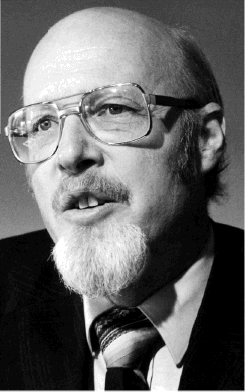
If you are a lucky person you at least once in your life met somebody who impressed you by the enormous personality he radiated, and whom you will never forget. Roland Frei has been such an individual, and the heritage he left to his friends and colleagues and to the International Association of Environmental Analytical Chemistry (IAEAC) is still living, even 20 years after his death on 29 January 1989. This makes it appropriate to recall the great influence Roland took on the development of a discipline that remains the label of our Association till today.
The broad view of what the term ‘environment’ comprises and how chemistry, in particular analytical chemistry, could contribute to environmental research is strongly related to Roland's CV. He was a cosmopolitan in the most marked sense of the word. Born as a Swiss citizen and starting his professional career as a chemical engineer in Switzerland, he moved around the world in an adventurous way most of us can only dream of: Ph.D. Work and degree in analytical chemistry at the University of Hawaii (1964), lecturer and instructor in Tokyo and American Samoa, professor of analytical chemistry at Dalhousie University, Halifax/Nova Scotia, Canada (1966), head of the analytical research department at Sandoz Ltd. in Basle, Switzerland (1972), and finally (1977) professor of analytical chemistry at the Free University at Amsterdam, The Netherlands.
These quite different experiences of life and his wide-awake eyes of a scientist made Roland become a convinced environmentalist. Already at an early stage of his professional career he directed his research towards the investigation of typical environmental compartments, almost exclusively employing chromatographic techniques such as TLC and, later, HPLC. He was a pioneer in developing on-line pre-column technology, post-column reaction detection and automated analytical systems. He liked to combine known principles in a novel way, to further develop them, and to test their applicability to real life. As a visionary scientist he established a claim for analytical chemistry in environmental research.
However, Roland overall loved life and loved to perform in an unconventional way. He always offered the best of him, knowledge and friendship, to his students and colleagues. He was always happy to meet old friends and make new ones and engage them in scientific ventures. It was with this will that he organised the First International Symposium on Environmental Analytical Chemistry in Halifax in 1971. This event marked the moment after which the term ‘Environmental Analytical Chemistry’ found its firm place in environmental research, nowadays in a rather broad sense. It was also like the ‘big bang’ for the International Association of Environmental Analytical Chemistry which later, in 1977, became incorporated under Swiss law with Roland as the first President. In 1972, he launched the International Journal of Environmental Analytical Chemistry that he directed as Editor until his death, just a few months after the 18th ISEAC that we co-organised in Barcelona.
The present volume is a result of what Roland established 38 years ago, and what ‘his’ IAEAC feels obliged to continue with.